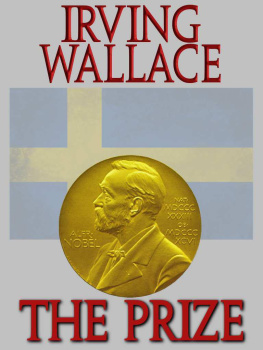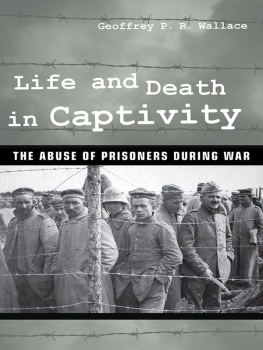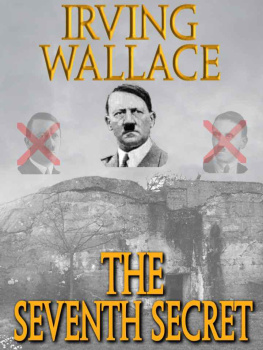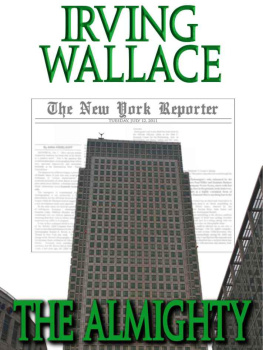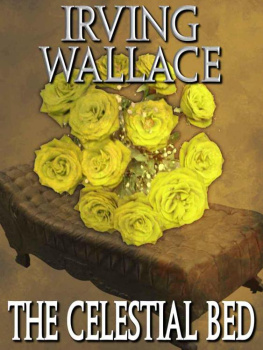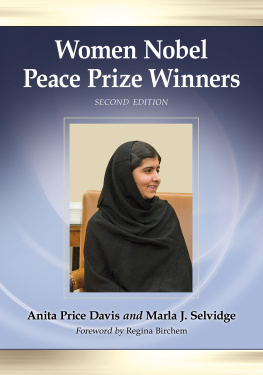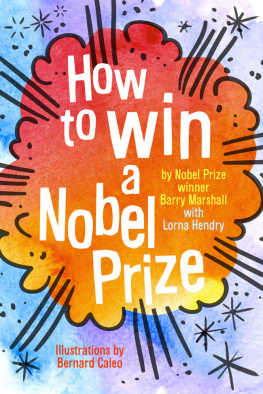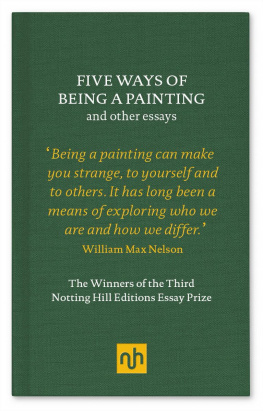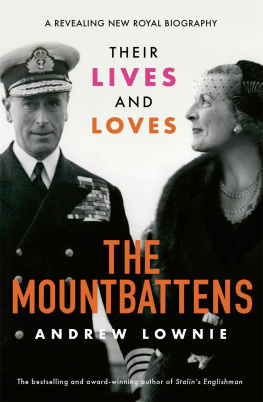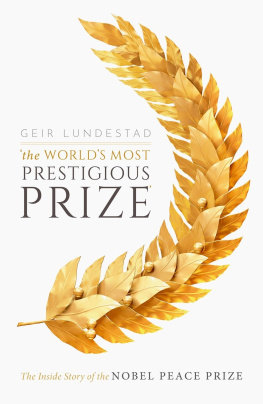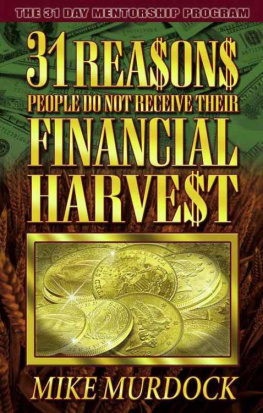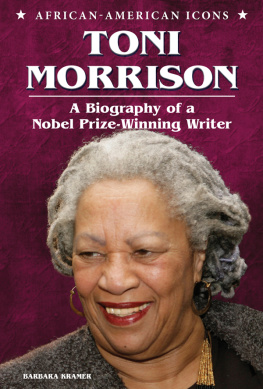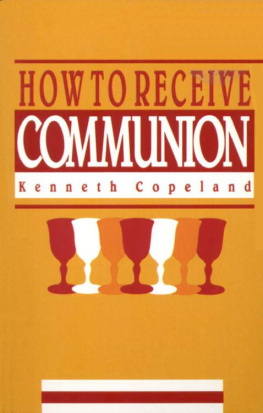Wallace - The Prize
Here you can read online Wallace - The Prize full text of the book (entire story) in english for free. Download pdf and epub, get meaning, cover and reviews about this ebook. publisher: Crossroad Press, genre: Detective and thriller. Description of the work, (preface) as well as reviews are available. Best literature library LitArk.com created for fans of good reading and offers a wide selection of genres:
Romance novel
Science fiction
Adventure
Detective
Science
History
Home and family
Prose
Art
Politics
Computer
Non-fiction
Religion
Business
Children
Humor
Choose a favorite category and find really read worthwhile books. Enjoy immersion in the world of imagination, feel the emotions of the characters or learn something new for yourself, make an fascinating discovery.
- Book:The Prize
- Author:
- Publisher:Crossroad Press
- Genre:
- Rating:3 / 5
- Favourites:Add to favourites
- Your mark:
- 60
- 1
- 2
- 3
- 4
- 5
The Prize: summary, description and annotation
We offer to read an annotation, description, summary or preface (depends on what the author of the book "The Prize" wrote himself). If you haven't found the necessary information about the book — write in the comments, we will try to find it.
Six people all around the world are catapulted to international fame as they receive the most important telegraph of their lives, which invites them to Stockholm to receive the prize. This will result to be a turning point in their lives, in which personal affairs and political intrigue will engulf every one of the characters.
The Prize — read online for free the complete book (whole text) full work
Below is the text of the book, divided by pages. System saving the place of the last page read, allows you to conveniently read the book "The Prize" online for free, without having to search again every time where you left off. Put a bookmark, and you can go to the page where you finished reading at any time.
Font size:
Interval:
Bookmark:
By Irving Wallace

First Digital Edition Published by Crossroad Press
Copyright 2011 by Amy Wallace & David Wallechinsky
Cover Design by David Dodd
This eBook is licensed for your personal enjoyment only. This eBook may not be re-sold or given away to other people. If you would like to share this book with another person, please purchase an additional copy for each person you share it with. If you're reading this book and did not purchase it, or it was not purchased for your use only, then you should return the vendor of your choice and purchase your own copy. Thank you for respecting the hard work of this author.
Try any title from CROSSROAD PRESS use the Coupon Code FIRSTBOOK for a onetime 20% savings! We have a wide variety of eBook and Audiobook titles available.
Find us at: http://store.crossroadpress.com
Dedicated to My Parents
Bessie and Alex Wallace
"The whole of my remaining realizable estate shall be dealt with in the following way:
The capital shall be invested by my executors in safe securities and shall constitute a fund, the interest on which shall be annually distributed in the form of prizes to those who, during the preceding year, shall have conferred the greatest benefit on mankind. The said interest shall be divided into five equal parts..."
-ALFRED BERNHARD NOBEL
November 27, 1895
"The honors of this world, what are they but puff, and emptiness, and peril of falling?"
-SAINT AUGUSTINE
c. 400 A.D.
The northern night had come early to Stockholm this day, and that meant that autumn was almost gone and the dark winter was near at hand.
For Count Bertil Jacobsson, as he walked slowly through the lamplit Humlegarden park, his lion-headed brown cane barely brushing the hardened turf, it was a happy time, his favorite time of the year. He knew the promise of this cold premature night: the winds would come, and the mists sweep in from Lake Malaren, and eventually, the snow and ice; and there would be no guilts about locking himself in his crowded, comfortable apartment, hibernating among his beloved mementos of a half century, and working on his encyclopedic Notes.
Emerging from the park, Count Bertil Jacobsson arrived at last on the sidewalk of Sturegatan. The evening's constitutional was over, and the final exciting business of the nightthe culmination of ten months of intensive and abrasive activitywould soon take place. For a moment, almost wistfully, he turned to look back at the park. To any other man, what had recently been so lush and green might now seem stark and denuded, the trees stripped of foliage and outlined grotesquely in the artificial light like gnarled symbols of life's end in a surrealistic oil. But Jacobsson's peculiar vision transformed the scene by some special alchemy to a kind of initiation of life, a nativity when nature was reborn, and the old year at last delivered of first life. Again, he told himself, his favorite season had arrived, and tonight, this night, would be a memorable one.
Turning back to the street, automatically glancing to the right and then to the left, and reassured that the thoroughfare was empty of traffic, Count Bertil Jacobsson began to cross it almost briskly, swinging his cane in a wide arc. When he reached the opposite sidewalk, he stood directly before the narrow six-story building that was Sturegatan 14.
Tugging open one of the two towering metal doorsit had become more and more a feat of strength in recent yearshe entered the Foundation building, and, as ever, felt warm and safe inside the dim hallway that led to his office, his home, his museum, his life. Moving forward, he heard his leather footsteps on the marble floor, then paused briefly, as was his habit, before the giant sculptured bust of Alfred Nobel. Studying the sensitive, craggy, bearded face, Jacobsson was again unsure. Was this the way the old man had really looked, the way he remembered his looking, when Nobel was very old and he was very young? At last, with a sigh, he turned left, moved past the sign on the wall reading NOBELSTIFTELSEN, and with effort climbed the marble staircase to what American visitors persistently misnamed the second floor.
Opening and closing one of the glass-paned doors, Jacobsson again found himself in the reception corridor, with its familiar green carpet and rows of tables and chairs. Proceeding along the corridor, he noticed the bookcases on either side, those on the one side packed with investment journals (to which he constantly objected, no matter how often he was told that the Board's primary job was one of finance), and those on the other side with expensively bound sets of Spanish, French, German and English works of the winners of decades past.
He could see Astrid Steen, his plump secretary, standing at an open file behind the counter of the reception office, her back to him. "Mrs. Steen"
She turned quickly, dutifully, and he saw on her face the same sense of excitement that was mounting within him.
"Are the telegrams ready?" he inquired.
"Oh, yes, siron your desk."
"Where is everyone?"
"Up in the apartment. They are drinking your whiskey, I'm afraid."
He chuckled. Every year, the same.
"For them, the job is over," Mrs. Steen added.
"Not yetnot yet"
"The Foreign Office called. An attach is on his way."
"Good. I shall be in my office."
Count Bertil Jacobsson went into the Executive Director's room, regretting his superior's recent illness, but secretly pleased that as Assistant Director the task was wholly in his hands. He hastened through the small office, and entered his own even smaller office, in the adjacent room.
Removing his felt hat and wool overcoat, and carefully placing his cane in a corner, Jacobsson winked gaily at the portrait of his friend, old King Gustaf V, that hung on the facing wall. He saw the large manila folder on his desk, quickly took it, and then sat down heavily on the soft blue sofa.
With rising anticipation, he opened the manila folder. He was pleased that this year, at his suggestionhe could not remember that it had ever happened beforethe Royal Academy of Science, the Caroline Institute, the Swedish Academy, and the Nobel Committee of the Norwegian Storting had all agreed to make their choices known to the world simultaneously. It would provide for greater drama, Jacobsson had argued, and he knew that he would be proved right.
Studying the contents of the open folder in his hand, he suddenly frowned. Quickly, he shuffled the typewritten telegram sheets for the one that was missing, and, then, he remembered. The Norwegian Storting had, just as it had sixteen times in the past, informed the Nobel Foundation that it would' not give a peace prize this year. Recollecting the decision that had been transmitted yesterday, again he silently nodded his approval. This was a time for many things, but not for public accolades to peacemakers.
Gingerly, lovingly, he held up the first drafted telegram, and moved his lips as he read it to himself.
IN RECOGNITION OF... IN SUPPORT OF HUMANITARIAN IDEALS... THE NOBEL FOUNDATION OF STOCKHOLM ON BEHALF OF THE SWEDISH ACADEMY IS PLEASED TO INFORM YOU THAT YOU HAVE TO DAY BEEN VOTED THIS YEARS NOBEL PRIZE... DETAILS FOLLOW STOP HEARTIEST CONGRATULATIONS STOP...
There was a rap on the door. Jacobsson looked up, as Mrs. Steen put her head in.
"The attach is here, sir. He is ready for the telegrams.
Yesyesone moment"
Hastily, Count Bertil Jacobsson counted the telegrams, read and reread them to see that all were in proper order, and at last he rose, and almost reluctantly handed them to Mrs. Steen.
Font size:
Interval:
Bookmark:
Similar books «The Prize»
Look at similar books to The Prize. We have selected literature similar in name and meaning in the hope of providing readers with more options to find new, interesting, not yet read works.
Discussion, reviews of the book The Prize and just readers' own opinions. Leave your comments, write what you think about the work, its meaning or the main characters. Specify what exactly you liked and what you didn't like, and why you think so.

